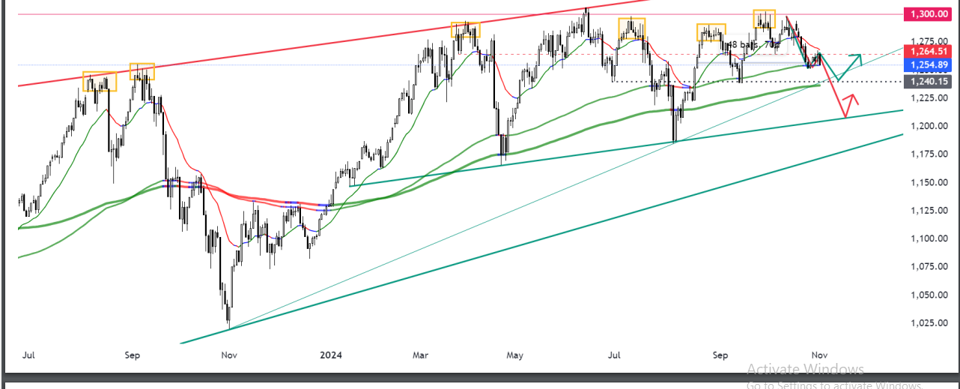Kinhtedothi-The race between the two US presidential election candidates is still very tense before G-hour. According to experts, while waiting for the election results (it may take many days for the vote counting to be completed), some fluctuations may occur in the stock market.
Many oppositions in economic management
Specifically, November 5 (local time) is the time when the 2024 US election takes place and is the race between Republican candidate Donald Trump and Democratic candidate Kamala Harris.

In a preliminary assessment of the policies of the two candidates, Agribank Securities Analysis Center (Agriseco Research) found that Ms. Kamala Harris's policies tend to be more moderate, maintaining international cooperation and prioritizing the middle class. Meanwhile, Mr. Donald Trump focuses more on protecting domestic manufacturing enterprises and encouraging investment in domestic production.
Stock analysts say that the policies proposed from the US election are the hot spot in economic policy.
Regarding corporate taxes, the investment strategy report of VPBank Securities Company said that Mr. Donald Trump proposed to extend some parts of the Tax Cuts and Jobs Act of 2017, mainly the provisions that will expire in 2025: Reducing corporate taxes from 21% to 15%; promoting investment and economic growth, with the expectation of an average annual growth rate exceeding 3%. Those in the richest 0.1% of the country will see their after-tax income increase by nearly $377,000. Meanwhile, the poorest 20% will only receive an additional $320.
VPBankS experts assessed that these policies could cause the US budget to lose $6,000 billion or more, even if tax cuts are not extended, the US could still face a deficit of $22,000 billion in the next decade. Trump's tax cuts will have little impact on overall growth in 10 years because of the increased debt.
Regarding tariffs on imported goods, Mr. Donald Trump proposed to apply a 10-20% tariff on all foreign imports into the United States and a 60%-100% tariff or higher on Chinese goods. He affirmed that the policy would not increase inflation. The main goal of this tariff is to make imported goods more expensive, thereby promoting domestic production and increasing domestic employment.
Former President Donald Trump also proposed not taxing tips, overtime or employee benefits and stopping the collection of taxes on Social Security benefits. Ms. Harris also supports the idea of not taxing tips. "Excluding tips from taxation is unlikely to provide much of an economic boost even if some individuals feel better off since only 2.5% of workers receive tips and many do not earn enough to pay income tax to the federal government," the VPBankS report said.
On taxes, Kamala Harris's policies propose to cut taxes for middle- and low-income earners, while also proposing to increase taxes on the wealthy, and increase the corporate tax rate from the current 21% to 28%. Kamala Harris's policies are estimated to cost the US an additional $2.3 trillion. The proposal to increase corporate taxes to 28% would raise an additional $1.1 trillion in tax revenue. The average income of the richest 0.1% would be reduced by about $167,000. Conversely, the poorest 20% would receive an additional $2,355.
VPBankS calculations show that Kamala Harris’s plan would hurt growth more than Trump’s. Experts say both Harris and Trump would cause the country’s debt to rise faster than it is now because this would weaken American companies and slow down the economy.
Which industries benefit?
Based on policy highlights, the analysis team believes that there are many contrasting points in the way the two presidential candidates manage the economy, and at the same time, proposes two scenarios for each presidential candidate.
Agriseco Research offers two scenarios. In the scenario where Ms. Harris is elected, moderate policies will not change much about Vietnam's economic trends. Export groups will still benefit from the Democratic candidate's pro-multilateral trade trend.
The scenario of Mr. Trump being elected, many changes, including increasing import tax, reducing corporate income tax, attracting FDI to the US and the President being able to intervene in the Fed's monetary policy will affect Vietnam's corresponding industries and fields such as import and export, FDI, exchange rate...
Regarding exports, Vietnam is affected by Trump's policy in two ways: First, the policy of increasing import tax by 10-20% for all countries, including Vietnam, reduces the competitiveness of Vietnamese goods compared to domestic goods in the US. In addition, investigations of origin to prevent tax evasion will occur more often, increasing costs and affecting business operations. Second, the gap caused by taxed Chinese goods will create opportunities for Vietnamese enterprises to export to the US and gain market share.
Regarding investment capital flows, the policy of imposing tariffs on Chinese goods may cause the wave of FDI leaving this country to continue strongly. Vietnam will still be a potential destination for the above FDI flows.
Regarding other economic issues, Donald Trump's policies are expected to increase US inflation in the short term, affecting the strength of the USD and many other economic items, including the roadmap for easing monetary policy, will change.
In fact, in October, when the odds of Mr. Trump winning the election increased, the DXY index representing the strength of the USD increased by nearly 3.3%; the price of gold futures increased by 5.5%, continuously reaching new peaks; forecasts on the interest rate cut roadmap in 2025 were also extended. This is also one of the factors affecting the Vietnamese stock market in the recent past and the near future.
Forecasting the trend of the stock market during the week of the US Presidential election, VPBankS experts believe that the VN-Index may react technically from 1,240 - 1,250 points, creating a short-term technical recovery with an expected fluctuation range of 1,240 - 1,265 points. The possibility of a sharp decline may appear if the index loses the support of 1,240 points.
Regarding investment strategy, experts recommend continuing to reduce the portfolio weight in short-term recovery waves, keeping the cash/stock ratio at 70/30, waiting for disbursement at medium-term buying points. For investors who prefer trading, they can wait for the disbursement zone at the support level of 1,235 - 1,240 points to catch recovery waves. Currently, the market trend still has many potential fluctuations, so prioritize short-term trading strategies. The medium-term buying zone is at 1,185 - 1,200 points.
Source: https://kinhtedothi.vn/tac-dong-cua-bau-cu-my-den-thi-truong-chung-khoan-viet-nam.html


































































































Comment (0)